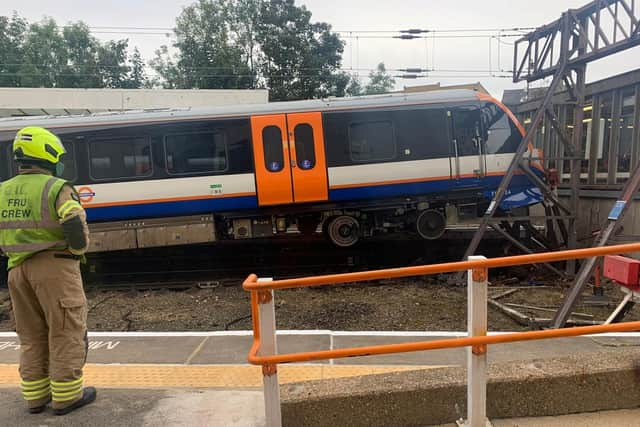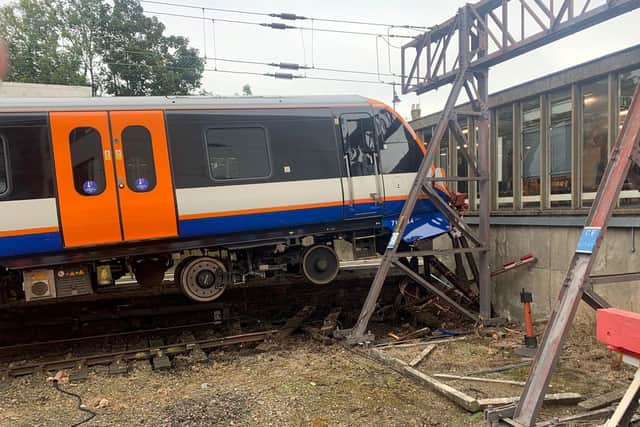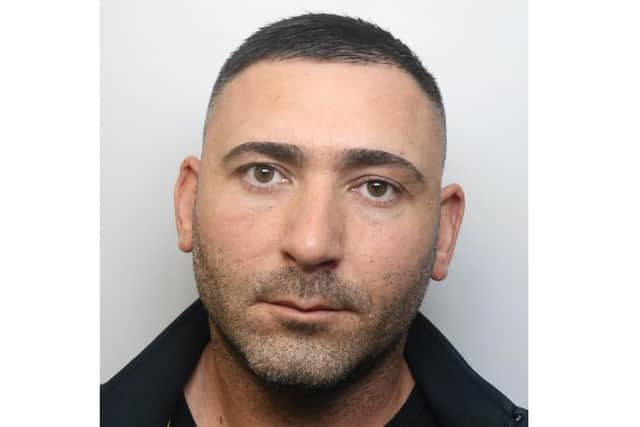Enfield train crash: Jail for Arriva driver who tested positive for cocaine after derailment
and live on Freeview channel 276
A “significantly fatigued” train driver tested positive for cocaine after an accident in which he failed to break in time at a London station.
An Arriva Rail London (ARL) train crashed into the buffer at Enfield Town station on October 12, 2021.
Advertisement
Hide AdAdvertisement
Hide AdAround 50 people were on the train and some sustained minor injuries. The buffer stop was damaged.
A newly released report by the Rail Accident Investigation Branch (RAIB) says the train was travelling at 7.7 mph (12 km/h) at the time of the collision. The train rode up on the buffer stop, coming to a rest with its leading wheels about 80cm above the rails.
The report states that the driver, Erkan Mehmet, 4, of Middle Street, Waltham Abbey, was fatigued and that he had taken cocaine in the days before the accident.
The RAIB said: “The train had been travelling at 10 mph (16 km/h) when it was 69 metres from the buffer stop. After briefly applying the brakes, the driver made no further control actions for just over seven seconds, until they made an emergency brake application just before the train hit the buffer stop. This occurred too late to prevent the collision. The accident occurred because the driver of the train did not apply the brakes in time, as a result of him losing awareness of the driving task. The loss of awareness was probably a result of him being significantly fatigued at the time. Post-accident drug and alcohol tests of the driver also yielded a positive result for a recreational drug.
Advertisement
Hide AdAdvertisement
Hide Ad“The driver had not reported his fatigue to his employer, who in turn had not identified his fatigue when he signed on duty, or that his personal circumstances made him vulnerable to fatigue. There was also a potential conflict between his employer’s processes for ensuring that staff attended for duty and for managing levels of staff fatigue.”


Cocaine
The report itself said: “Immediately after the accident, ARL arranged for the driver to be ‘for cause’ tested for alcohol and drugs. Although he passed the alcohol test, the urine test for drugs showed positive for a breakdown product of cocaine. A hair test taken by BTP five weeks after the accident also tested positive for signs of cocaine.
“RAIB commissioned a toxicology expert to interpret the drug test results. They concluded that the urine test indicated that it was likely that the driver had taken cocaine within the one or two days immediately before the accident. They also stated that the hair analysis confirmed that there had been historical use of cocaine over an undefined period, and that it was not possible to determine whether this usage was over the long or short term.
“The toxicology expert stated that the use of cocaine can lead to acute psychological effects which can increase an individual’s alertness and attentiveness. It can also affect cognitive behaviour, including an individual’s ability to drive a vehicle, and this could have affected the driver’s situational awareness and judgement at the time of the accident.”
Advertisement
Hide AdAdvertisement
Hide AdThe report says that none of the engineered systems automatically applied the train’s brakes, as the conditions for their intervention were not met. The Train Protection and Warning System did not activate because the train was travelling below the speed at which the system would be triggered.
Recommendations
The RAIB made two recommendations. The first calls on Arriva to encourage staff to report fatigue that could affect their ability to do their jobs safely.
The second, addressed to Network Rail in conjunction with RSSB, seeks to improve the risk assessment process for collisions with buffer stops at terminal platforms.
The RAIB also identified three learning points. The first reminds Network Rail and train companies that engineered safeguards do not protect against all events, and that operational controls may also be required to manage risk. The second reminds train staff of the importance of reporting fatigue when it affects their ability to work safely. The third reminds staff of the need to comply with their employer’s drug and alcohol policies.
Advertisement
Hide AdAdvertisement
Hide Ad

Arriva
Paul Hutchings, managing director at Arriva Rail London, said: “We take the safety of our customers and colleagues incredibly seriously and provided every assistance to the Rail Accident Investigation Branch (RAIB) during its investigation. We have a zero-tolerance policy for drugs and alcohol, which exceeds industry standards, and the driver involved was immediately suspended following the incident and subsequently dismissed after returning a positive test result.
“While our robust fatigue and lifestyle management procedures have always met industry standards, we recognise the recommendations made by RAIB and have already made enhancements. We are committed to continuously improving our approach to managing fatigue and will work closely with the wider industry as we do so.”
The release of the report had been delayed due to legal proceedings, but it has now been published by the government as “the status of those proceedings has now changed”.
Katie Frost, Network Rail’s route director for Anglia, said: “We take incidents like this incredibly seriously and we are working in collaboration with TfL and the train operators through the industry safety and standards body to review our risk assessments in line with the RAIB recommendations.”
Erkan Mehmet sentenced
UPDATE: July 7, 2023
Advertisement
Hide AdAdvertisement
Hide AdOn Friday July 7, Erkan Mehmet was sentenced to 16 weeks in prison, having pleaded guilty to endangering the safety of the railway.
Detective Constable Gemma Littlewood, from British Transport Police, said: “Train drivers are entrusted with the safety of every passenger onboard so it is frankly unthinkable that Mehmet turned up to work in a condition which left him falling asleep at the wheel, putting them all in significant danger. It is only through luck that nobody was seriously injured or worse, killed, as a result of his actions that day.
“Investigators have worked closely with Arriva Rail London, who fully supported the investigation, to ensure he has been brought before the courts to face justice and while incidents like this are rare, we will continue to relentlessly investigate anyone suspected of putting passengers in danger and hold them to account.”


Paul Hutchings, managing director at Arriva Rail London, said: "We take the safety and security of our customers and colleagues incredibly seriously. We have a zero-tolerance policy for drugs and alcohol, which exceeds industry standards, and the driver involved was immediately suspended following the incident and subsequently dismissed after returning a positive test result.”
Comment Guidelines
National World encourages reader discussion on our stories. User feedback, insights and back-and-forth exchanges add a rich layer of context to reporting. Please review our Community Guidelines before commenting.
